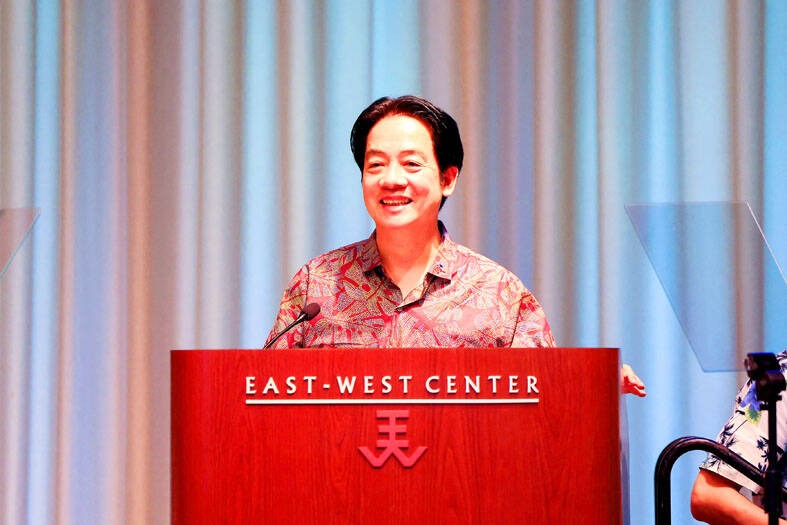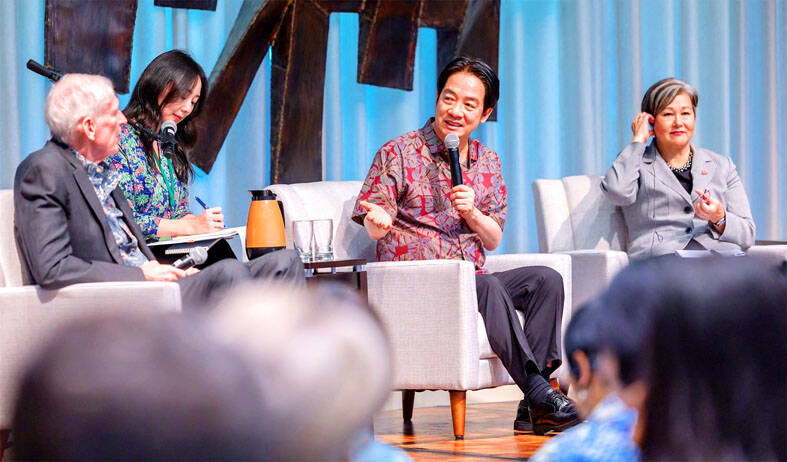Taiwan will take three proactive actions in the Indo-Pacific region and globally to achieve peace and prosperity through defense and economic strength, President William Lai (賴清德) told a forum during his stopover in Hawaii on Sunday.
Lai visited the East-West Center (EWC) in Honolulu for the closed-door forum, which was attended by about 100 guests and hosted by EWC president Suzanne Vares-Lum, with former American Institute in Taiwan chairman James Moriarty and former EWC president Richard Vuylsteke joining Lai in the discussion.
“The EWC is delighted to host Lai this afternoon and to hear his thoughts on Taiwan’s commitment to regional peace and security, and economic collaboration with the US,” the EWC cited Vares-Lum as saying ahead of the forum.

Photo: Reuters
Lai gave an eight-minute address titled “A Future of Mutual Prosperity: Taiwan as a Partner for Peace and Prosperity in the Indo-Pacific Region,” and exchanged gifts with Vares-Lum.
Presidential Office spokeswoman Karen Kuo (郭雅慧) after the forum cited Lai as saying at the forum that Taiwan would take three proactive actions for the Indo-Pacific region and the broader world.
First, Taiwan would actively implement a “four pillars of peace” action plan, which includes buttressing self-defense capabilities, enhancing economic security, deepening democratic partnerships, and facilitating cross-strait dialogues and exchanges.

Photo: AFP / Presidential Office
Taiwan has established the Whole-of-society Defense Resilience Committee as part of the Presidential Office and enhanced cooperation with the US, demonstrating its commitment to national defense, as well as Taiwan and the US’ joint commitment to Indo-Pacific peace, Kuo cited Lai as saying.
The second action is for Taiwan to actively contribute to global supply chains, especially in high-tech industries such as semiconductors.
The Taiwan-US partnership not only facilitated Taiwan’s contribution, but manifested the strategic significance of Taiwan as a reliable partner, Lai was cited as saying, adding that Taiwan also collaborated with other like-minded nations to aid global development with its knowledge and expertise.
Finally, Taiwan is devoted to ensuring peace, stability and prosperity in the Taiwan Strait and the Indo-Pacific region, and it continues to cement friendly relations with Pacific allies through transparent collaborations and fulfillment of commitments in the fields of public health, fisheries, animal husbandry and climate transition, with the goal of achieving smart sustainability, and democratic and diplomatic sustainability, Kuo cited Lai as saying in his address.
Taiwan would also strengthen its self-defense capabilities and cooperate closely with like-minded nations in line with the common cause of “peace through strength,” jointly defending the universal values of freedom, democracy and rule of law, the president was cited as saying.
Kuo also quoted Lai as saying in a question-and-answer session that although Taiwan’s biggest challenge is threats from China, Taiwanese have learned to deal with Chinese threats in an organized, stable manner.
As president, Lai believes his missions are to sustain the nation’s existence and development, buttress national defense capabilities — via independent defense, arms procurement and cooperation with other democracies — and protect the livelihood of the 23 million people of Taiwan, he was cited as saying.
Separately, the president held a 20-minute telephone call with former US House of Representatives speaker Nancy Pelosi, who reiterated her support for Taiwan participating in international organizations, Kuo said.
Lai telephoned several senior US politicians who are pro-Taiwan and “old friends” when in Hawaii, as per the practice of presidents stopping off in the US, Kuo said.
Kuo did not name everybody Lai spoke with, but confirmed Pelosi was among them. In their 20-minute call, Pelosi welcomed Lai to the US and congratulated him on winning the presidential election in January, Kuo said.
Pelosi also noted the bipartisan support for Taiwan in the US Congress and the importance of resolving the double-taxation issue between Taiwan and the US, Kuo said.
Both sides are currently working to come to an agreement on the issue.
Pelosi praised Taiwanese as courageous, and lauded Taiwan’s commitment to freedom and democracy, and its successful economic development, Kuo added.
Pelosi said the consequences of the world losing Taiwan were unimaginable, Kuo quoted the veteran Democrat as saying.
The former speaker also emphasized her support of Taiwan’s participating in international organizations, including the WHO, Kuo said, adding Lai and Pelosi also touched on issues including the semiconductor industry, artificial intelligence and the threat to Taiwan of Chinese military action.
Pelosi visited Taiwan from Aug. 2 to 3, 2022, making her the highest-ranking US official to visit the nation in 25 years.
The historic visit prompted Beijing to launch a series of retaliatory measures against Taiwan, including week-long large-scale military exercises that simulated a blockade.
Lai was spending two nights in Hawaii before traveling to the Marshall Islands and Tuvalu, two of Taiwan’s diplomatic allies in the South Pacific.
On his return journey, the president is to visit Guam for a one-day stopover, before heading to Palau, another nation that has formal diplomatic relations with Taiwan, on Thursday.
He is due to return to Taiwan on Friday.
The seven-day trip to the South Pacific is Lai’s first official overseas visit since assuming office in May.

AIR SUPPORT: The Ministry of National Defense thanked the US for the delivery, adding that it was an indicator of the White House’s commitment to the Taiwan Relations Act Deputy Minister of National Defense Po Horng-huei (柏鴻輝) and Representative to the US Alexander Yui on Friday attended a delivery ceremony for the first of Taiwan’s long-awaited 66 F-16C/D Block 70 jets at a Lockheed Martin Corp factory in Greenville, South Carolina. “We are so proud to be the global home of the F-16 and to support Taiwan’s air defense capabilities,” US Representative William Timmons wrote on X, alongside a photograph of Taiwanese and US officials at the event. The F-16C/D Block 70 jets Taiwan ordered have the same capabilities as aircraft that had been upgraded to F-16Vs. The batch of Lockheed Martin

GRIDLOCK: The National Fire Agency’s Special Search and Rescue team is on standby to travel to the countries to help out with the rescue effort A powerful earthquake rocked Myanmar and neighboring Thailand yesterday, killing at least three people in Bangkok and burying dozens when a high-rise building under construction collapsed. Footage shared on social media from Myanmar’s second-largest city showed widespread destruction, raising fears that many were trapped under the rubble or killed. The magnitude 7.7 earthquake, with an epicenter near Mandalay in Myanmar, struck at midday and was followed by a strong magnitude 6.4 aftershock. The extent of death, injury and destruction — especially in Myanmar, which is embroiled in a civil war and where information is tightly controlled at the best of times —

China's military today said it began joint army, navy and rocket force exercises around Taiwan to "serve as a stern warning and powerful deterrent against Taiwanese independence," calling President William Lai (賴清德) a "parasite." The exercises come after Lai called Beijing a "foreign hostile force" last month. More than 10 Chinese military ships approached close to Taiwan's 24 nautical mile (44.4km) contiguous zone this morning and Taiwan sent its own warships to respond, two senior Taiwanese officials said. Taiwan has not yet detected any live fire by the Chinese military so far, one of the officials said. The drills took place after US Secretary

THUGGISH BEHAVIOR: Encouraging people to report independence supporters is another intimidation tactic that threatens cross-strait peace, the state department said China setting up an online system for reporting “Taiwanese independence” advocates is an “irresponsible and reprehensible” act, a US government spokesperson said on Friday. “China’s call for private individuals to report on alleged ‘persecution or suppression’ by supposed ‘Taiwan independence henchmen and accomplices’ is irresponsible and reprehensible,” an unnamed US Department of State spokesperson told the Central News Agency in an e-mail. The move is part of Beijing’s “intimidation campaign” against Taiwan and its supporters, and is “threatening free speech around the world, destabilizing the Indo-Pacific region, and deliberately eroding the cross-strait status quo,” the spokesperson said. The Chinese Communist Party’s “threats